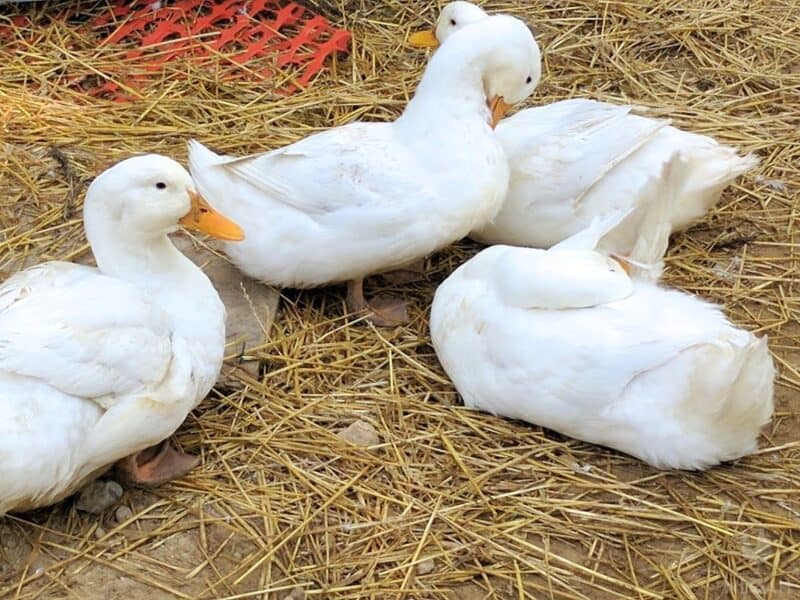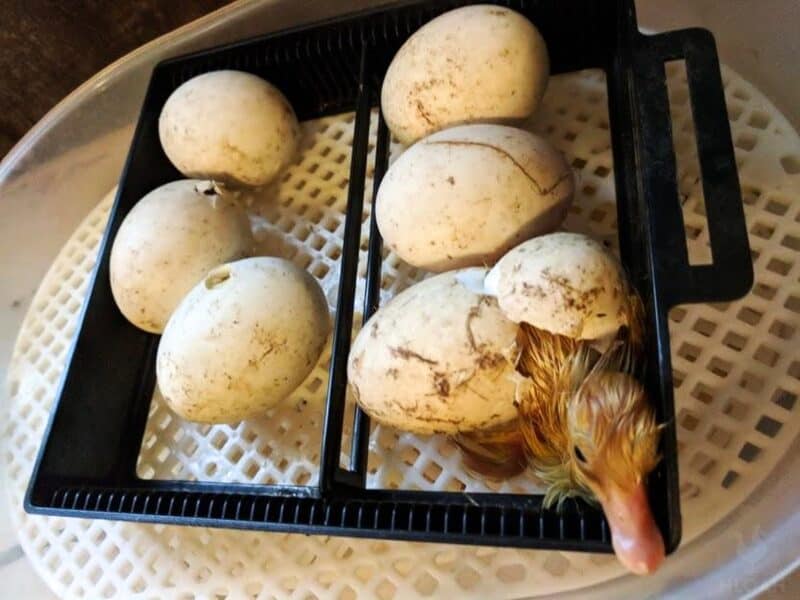Have you ever wondered how long a mother duck sits on her eggs? If you don’t own ducks yourself, you’ve probably never seen the process through to completion.

One day, a mother duck emerges from her nest with a bunch of precious little ducklings in tow. That’s all you know!
But the question remains: how long do ducks sit on their eggs?
A female duck will sit on her eggs for 25 – 29 days until they hatch. During this time, she will leave only for moments and only when necessary.
That’s a long shift, alright! You can’t say the poor mother isn’t motivated.
But there are so many more questions: what exactly does brooding look like? How do ducks ensure that their eggs stay safe while they wait for them to hatch?
In this article, we explore these questions and learn a lot more about how ducks hatch their eggs…
Would a Mother Duck Ever Leave Her Eggs?
Rarely, if ever, would a mother duck leave her eggs unattended. Mother ducks are extremely motivated and dedicated to the protection and incubation of their eggs.
They will go to the verge of starvation and dehydration while sitting, sacrificing their own health to ensuring that the eggs stay safe.
However, there are instances when a mother duck needs to leave her nest for a very short time to get food or water.
In these cases, she’ll make the trip as quick as possible to minimize the time spent away from her eggs.
Does a Mother Duck Still Eat When Sitting on the Nest?
Yes, as mentioned above, a mother duck will eat at some point while sitting on her nest. These trips for sustenance are kept very short and only occur when absolutely necessary, though.
A mother duck is willing to endure extreme hunger and thirst in order to ensure the protection of her eggs, but she won’t drop dead in the process- that will just mean her babies are doomed!
That said, any duck owner will tell you that it’s hardly uncommon for a mother duck to lose a lot of weight while brooding, and come out of the ordeal highly stressed and exhausted.

Do Ducks Know When Their Eggs Are About to Hatch?
It’s likely that a mother duck knows when her eggs are ready to hatch. After all, she’s been sitting on them for weeks!
But in seriousness, the mother duck is very in tune with her eggs, and can probably detect minute movements and stirrings in the eggs, or other sensations that will alert her to the fact.
She will definitely be able to tell when the eggshell begins to crack and the ducklings pip.
At any rate, don’t worry: she won’t be sitting on the little things when they’re struggling to get out.
What Does a Duck Do Before Laying?
A mother duck has much to do before she lays her eggs, specifically concerning the location and creation of her nest.
The very first thing is location of the nest site itself, if at all possible one in a concealed and safe location near a pond or lake.
Once the perfect spot is found, she will clear the site of obstacles that could hinder the nest’s construction.
Next, the mother will build the nest itself using natural materials: grasses, leaves, twigs and similar things. At some point during this building process, prior to laying the eggs, she will also pluck her brood patch.
This a soon-to-be featherless area on her abdomen that provides direct skin-to-egg contact for better heat transfer and humidity control; two essential factors to keep the eggs incubating and viable.
Also, her plucked feathers are not discarded as she will use them to line the nest itself, creating an additional soft layer and a truly warm environment for the eggs.
How Long Can Duck Eggs Survive Without Their Mother On Them?
Not very long at all. Duck eggs are quite vulnerable when left unattended by their mother, and their survival time without her warmth and protection is relatively short.
The specific duration depends on various things, including ambient temperature, humidity, and the stage of embryonic development.
In unfavorable conditions, the eggs can become unviable within as little as a couple hours, while in truly ideal conditions they might survive for a day or two.
But it’s important to note that this estimation doesn’t account for the very real potential threat of opportunistic predators, nest poachers, which are more much likely to target unprotected nests.
That is another motivation for the mother to return ASAP whenever she does leave the nest.
Can a Mother Duck Relocate Her Eggs?
Unfortunately, no: a mother duck does not have the ability to relocate her eggs in case of threat or accident.
While her commitment to her eggs is ironclad and she would do anything to protect them, physically moving the eggs from one location to another is simply not possible for her.
The most a mother duck can do to really move her eggs is to turn them within the nest itself to ensure even incubation.
In the event of danger or an unforeseen accident or catastrophic change at the nesting area, the mother duck’s only option is to hold fast or abandon them.
Do Male Ducks Help Hatch the Eggs?
Not really. Male ducks don’t directly assist in hatching the eggs, as they don’t incubate them like females. But the dads help out in their own way- sometimes.
A mother duck is responsible for sitting on the eggs and providing warmth, but the male’s role is more focused on guarding the nesting area from predators and interlopers.
The male duck may, and I emphasize may, stay nearby for a few weeks, possibly even until the eggs hatch, to help protect the nest and his baby momma from potential threats.
This behavior, though, isn’t consistent across all duck species or even individual ducks, and in many cases male ducks will leave the nesting area well before the eggs hatch.
That means mom is on her own! Ultimately, the main responsibility for the incubation and care of the eggs falls on the mother duck, every time.
How Long Can a Duck Egg Survive Without Heat?
Not long at all! At least, unless the nest is in a picture-perfect environment. Like I mentioned earlier, duck eggs (and most bird eggs, for that matter) are incredibly sensitive to fluctuations in temperature and humidity.
Duck eggs, for instance, must be incubated at an ideal temperature of 99.5°F and a high humidity level of around 70%.
The eggs won’t have those sustained conditions in the wild without mom there to sit on them!
A tiny bit higher or lower (of either) is not disastrous, but even brief exposure to unfavorable conditions can compromise their development, or their very survival.
This is yet another reason why mother ducks are so diligent about staying on their eggs; they understand innately that they are the only ones capable of regulating the temperature and humidity necessary for successful incubation.
It’s no understatement to say that the mother duck’s presence is mandatory to ensure the eggs’ viability- in the wild at least!
Will a Duck’s Eggs Hatch All at Once?
Not really all at once, but nearly so! Duck eggs may not hatch simultaneously, but they typically all hatch within a very close timeframe if they are viable and fully developed.
Most of the time, every egg in a clutch will hatch within a day (or two, at most) of each other, following that 4-week incubation period.
This sorta-synchronized hatching allows mom to switch her focus to caring for her newly hatched babies, ensuring that they stay safe and well-fed.
Tom has lived and worked on farms and homesteads from the Carolinas to Kentucky and beyond. He is passionate about helping people prepare for tough times by embracing lifestyles of self-sufficiency.
